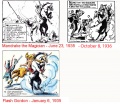The Slave Traders of Tygandi: Difference between revisions
(Usa section added) |
|||
| Line 91: | Line 91: | ||
*"Sudan Şahı", [[1001 Roman - Özel Sayı 29|''1001 Roman - Özel Sayı'' #29]] (1942) <small>Note: starts half-way through the original adventure.</small> | *"Sudan Şahı", [[1001 Roman - Özel Sayı 29|''1001 Roman - Özel Sayı'' #29]] (1942) <small>Note: starts half-way through the original adventure.</small> | ||
*"Sudan Şahı", [[1001 Özel 94|''1001 Özel'' #94]] (1953) | *"Sudan Şahı", [[1001 Özel 94|''1001 Özel'' #94]] (1953) | ||
=== [[Image:mini_usa.gif]] USA === | |||
*"The Slave Traders of Tygandi", [[Comics Revue 385-386|''Comics Revue'' #385-386]] (2018) | |||
[[Category:Daily stories|Slave Traders of Tygandi, The]] | [[Category:Daily stories|Slave Traders of Tygandi, The]] | ||
Revision as of 15:11, 13 October 2018
| The Slave Traders of Tygandi | |

| |
| Start date: | July 20th, 1936 |
|---|---|
| End date: | November 28th, 1936 |
| # of strips: | 114 (19 weeks) |
| Writer: | Lee Falk |
| Artist: | Phil Davis |
| Preceded by: | "The Return of the Clay Camel" |
| Followed by: | "Mandrake in the Lost World" |
"The Slave Traders of Tygandi" is the 7th Mandrake daily story. The story was written by Lee Falk and drawn by Phil Davis.
Plot Summary
In Alexandria Prince Segrid has gambled away the state funds intrusted to him. Emir Krim exploited the situation to kidnap Narda. He gave here to Sheik Nazdah who wanted to honor her as reigning favorite in his harem. Sheik Nazdah changed his mind and decided to sell Narda at the slave marked in Tygandi.
At the slave marked the rich and mysterious Shah of Sudan bought Narda for an enormous sum, in addition to all the other women that were for sale.
Appearances
Recurring characters
One-time characters
- Sir Oswald
- Emir Krim
- Sete, a thug.
- Bula, a thug.
- Samuel Smith, aka the mummy.
- Sheik Nazdah
- Hamid, a slave dealer.
- Felli, auctioneer of the slave mart.
- The Shah of Sudan, Mandrake in disguise.
Locations
- Egypt
- Pyramid of Gizen
- Alradi, an oasis.
- Tygandi, a portable slave marked at the north shore of the dead lake.
Behind the scenes
Title
- The title for the story is lifted from the plot.
Swiping
It is not an uncommon practice amongst comic strip and comic book artists to "borrow" (swipe) layouts and drawing styles from other artists. In an interview published in King Comic Heroes (James Van Hise, Pioneer Books, 1988), Lee Falk tells an amusing anecdote from the early days of his Mandrake strip:
"When I was working with Phil Davis doing layouts very early in the game, we had a Sunday page which had some rearing horses. Now these are illustrative artists and they use photo references and whole files of other artists' material. When I indicated a rifle or a gun or a tank, he had a model or something to copy from. They didn't copy it -- they used the file to get something for a model and they sketched from it. They didn't trace it or anything like that. They had to have a model just like they'd have a model for a woman. At that very moment, in I think it was Flash Gordon, they had some rearing horses. We used that as inspiration, but we didn't copy it. About a year later I moved to New York, and I went up and I had dinner with Alex Raymond up in Stamford where I'd moved to in Connecticut and he was showing me through his studio in his beautiful house and there on his drawing board was the Flash Gordon he was working on and next to it was the Sunday page of Mandrake with the rearing horses -- he was using it as a model. I said, 'But Alex, we copied that from you!' He said "Oh, for Christ's sake!' He'd forgotten."
Although Alex Raymond did not finish the strip that Lee Falk spoke about, Phil Davis swiped a horse from Flash Gordon once more:
Reprints
This story has been published in the following publications:
 Australia
Australia
- "The Slave Mart of Tygandi", Mandrake The Magician (1938)
 Brazil
Brazil
- "Mandrake entre as Múmias", Mandrake #3 (2015)
 France
France
- "L'oasis d'acradi", Hop-là! (1938-1939)
- "L'oasis d'acradi", Spécial Mandrake #36 & Spécial Mandrake #37 (1966)
- "L'enfer du jeu", Mandrake le Magicien Vol. 4 (1985)
 Italy
Italy
- "La mummia vivente", L'Avventuroso #153 - #169 (1937-1938)
- "La mummia vivente", Collana Albi grandi avventure - Mandrake #7 (1938)
- "La mummia vivente", Giungla! #127 to #131 (1938)
- "La mummia vivente" & "L'oasi di Acradi", Mandrake #17 & #18 (1947)
- "Nell'oasi di Acradi", Special Mandrake #165 and #166 (1966)
- "La mummia vivente", Mandrake - New Comics Now #117 (1984)
- "La mummia vivente", Mandrake 7 (Comic Art) (1992)
- "La mummia vivente", Mandrake il mago (2014)
 Mexico
Mexico
- "La momia de ankt", "El rapto de Narda" & "??", Paquito #11021 to #11023 (1953)

 Spain
Spain
- "La Momia Viviente", Grandes Clásicos de los Comics del Pasado #25 - Mandrake #7 (1983 ?)
 Turkey
Turkey
- "Sudan Şahı", 1001 Roman - Özel Sayı #29 (1942) Note: starts half-way through the original adventure.
- "Sudan Şahı", 1001 Özel #94 (1953)
 USA
USA
- "The Slave Traders of Tygandi", Comics Revue #385-386 (2018)
